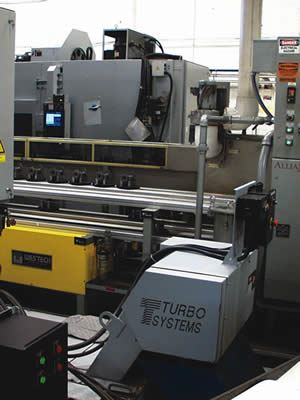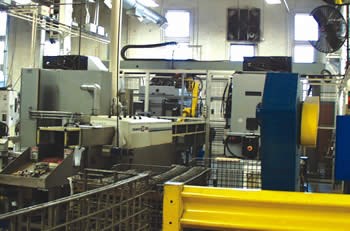Machining Centers Create Special Chip Conveying Requirements
The capability of cells of machining centers to perform a variety of functions in one location can boost productivity. As a component of lean manufacturing, these flexible systems may reduce the number of times parts are touched during a series of machining processes. However, the overall efficiency of these cells can suffer because of inefficient chip conveyance and coolant management systems.
Share


The capability of cells of machining centers to perform a variety of functions in one location can boost productivity. As a component of lean manufacturing, these flexible systems may reduce the number of times parts are touched during a series of machining processes. However, the overall efficiency of these cells can suffer because of inefficient chip conveyance and coolant management systems.
When these machines create chips of various sizes, shapes and materials, choosing the right chip conveyor is critical. Taco Inc., a Rhode Island-based manufacturer of pumps and other HVAC components, found this out the hard way. With its customer demand doubling and an increase from 12 to 35 pump models in production, the company was forced to re-examine its manufacturing methods. One proposed solution was to create a cell with four new HMCs (all robotically loaded) in a tight corner of the manufacturing facility. This system would allow multiple pump casing models to run simultaneously, thus eliminating change-overs and reducing operator time per part.
However, the close quarters would make it impossible to continue manually unloading chip hoppers throughout the day without interrupting the workflow, and it would be nearly impossible to perform maintenance if chips accumulated within the system. Another consideration was that the machines within the new cell would be machining both cast iron and bronze, often at the same time. Therefore, the chip conveying system would need to accommodate a mixed load of materials and cuttings, each of which presented challenges.
What worked for the company was introducing Turbo Systems chip conveyors from LNS America, Inc. (Cincinnati, Ohio). The LNS engineers designed a system using MicroScraper 500 filtering conveyors at each machining station coupled with a Turbo 3D disc conveyor that moves the chips to a central disposal point.
The MicroScraper conveyors incorporate self-cleaning filter boxes that require no filtering medium. The perforated boxes filter the coolant as it passes from the conveyor side to the clean side of the Turbo coolant tank. Because the system’s drag links scrape chips along the bottom of the conveyor body and up an incline, the system is suited for Taco’s mix of materials. It passes the chips to the enclosed 3D disc automated chip disposal system, which uses an endless chain with attached blades to pull the chips through a sealed pipe to the central storage hopper.
According to Taco Manufacturing Engineer Bill Young, the tight quarters of this installation made it imperative that the chip-conveying systems be virtually maintenance-free. With other chip conveyors, the company found that deposits of cast iron chips would accumulate. The entire system would then have to be disassembled. All of the coolant would be pumped out and then the buildup of chips would be removed.
“The Turbo system has been here more than 2 years, and it has not required maintenance,” says Mr. Young.
He adds that the Turbo high-pressure coolant systems, which are another part of the installation, have also extended tooling life, especially that of the No. 20 carbide drills used for tapping holes.




























